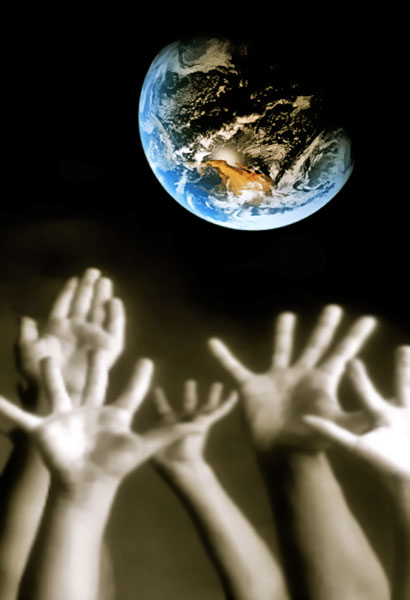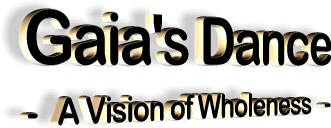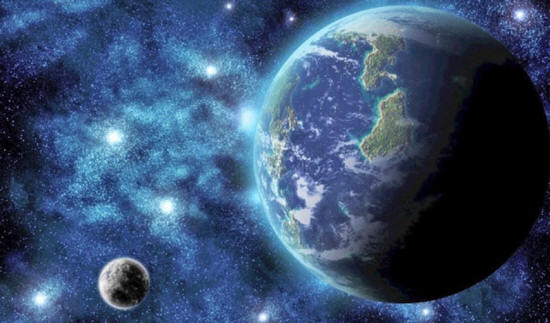"Everyone knows that
humanity is in crisis, politically, economically, spiritually,
ecologically, any way you look at it.
Many see humanity as
close to suicide by way of our own technology; many others see
humans as deserving God's or nature's wrath in retribution for
our sins…
Our intellectual heritage for thousands of years, most strongly
developed in the past few hundred years of science, has been to
see ourselves as separate from the rest of nature, to convince
ourselves we see it objectively - at a distance from ourselves -
and to perceive, or at least model it, as a vast mechanism.
This objective mechanical worldview was founded in ancient
Greece when philosophers divided into two schools of thought
about the world.
-
One school
held that all nature, including humans, was alive and
self-creative, ever making order from disorder.
-
The other
held that the 'real' world could be known only through
pure reason, not through direct experience, and was
God's geometric creation, permanently mechanical and
perfect behind our illusion of its disorder.
This
mechanical/religious worldview superseded the older one of
living nature to become the foundation of the whole Western
worldview up to the present.
Philosophers such as Pythagoras, Parmenides, and Plato were thus
the founding fathers of our mechanical worldview, though
Galileo, Descartes, and other men of the Renaissance translated
it into the scientific and technological enterprise that has
dominated human experience ever since.
-
What if
things had gone the other way?
-
What if
Thales, Anaximander, and Heraclitus,
the organic philosophers who saw all the cosmos as
alive, had won the day back in that ancient Greek
debate?
-
In other
words, what if modern science and our view of human
society had evolved from organic biology rather than
from mechanical physics?
We will never know
how the course of human events would have differed had they
taken this path, had physics developed in the shadow of biology
rather than the other way around.
Yet it seems we were destined to find the biological path
eventually, as the mechanical worldview we have lived with so
long is now giving way to an organic view - in all fairness, an
organic view made possible by the very technology born of our
mechanical view.
The same technology that permits us to reach out into space has
permitted us to begin seeing the real nature of our own planet
to discover that it is alive and that it is the only live planet
circling our Sun.
The implications of this discovery are enormous, and we have
hardly even begun to pursue them.
We were awed by
astronauts' reports that the Earth looked from space like a
living being, and were ourselves struck by its apparently live
beauty when the visual images were before our eyes.
But it has taken time to accumulate scientific evidence that the
Earth is a live planet rather than a planet with life upon it,
and many scientists continue to resist the new conception
because of its profound implications for change in all branches
of science, not to mention all society.
The difference between a planet with life on it and a
living planet is hard at first to understand.
Take for example the
word, the concept, the practice of ecology, which has become
familiar to us all within just the few short decades that we
have been aware of our pollution and destruction of the
environment on which our own lives depend.
Our ecological understanding and practice has been a big,
important step in understanding our relationship to our
environment and to other species.
Yet, even in our
serious environmental concern, we still fall short of
recognizing ourselves as part of a much larger living entity.
It is one thing to be careful with our environment so it will
last and remain benign; it is quite another to know deeply that
our environment, like ourselves, is part of a living planet.
The earliest microbes into which the materials of the Earth's
crust transformed themselves created their own environments, and
these environments in turn shaped the fate of later species,
much as cells create their surroundings and are created by it in
our own embryological development.
As for physiology, we already know that the Earth regulates its
temperature as well as any of its warm-blooded creatures, such
that it stays within bounds that are healthy for life despite
the Sun's steadily increasing
heat.
And just as our bodies continually renew and adjust the balance
of chemicals in our skin and blood, our bones and other tissues,
so does the Earth continually renew and adjust the balance of
chemicals in its atmosphere, seas, and soils..
Certainly it is ever more obvious that we are not studying the
mechanical nature of Spaceship Earth but the self-creative,
self-maintaining physiology of a live planet.
Many still take the live Earth concept, named Gaia after
the Earth goddess of early Greek myth, more as a poetic or
spiritual metaphor than as a scientific reality.
However, the name Gaia was never intended to suggest that the
Earth is a female being, the reincarnation of the Great Goddess
or Mother Nature herself, nor to start a new religion (though it
would hardly hurt us to worship our planet as the greater Being
whose existence we have intuited from time immemorial).
It was intended simply to designate the concept of a live
Earth, in contrast to an Earth with life upon it…
We now recognize the Earth as a single self-creating being that
came alive in its whirling dance through space, its crust
transforming itself into mountains and valleys, the hot moisture
pouring from its body to form seas.
As its crust became
ever more lively with bacteria, it created its own atmosphere,
and the advent of sexual partnership finally did produce the
larger life forms - the trees and animals and people.
The tale of Gaia's dance is thus being retold as we piece
together the scientific details of our planet's dance of life.
And in its context, the evolution of our own species takes on
new meaning in relation to the whole.
Once we truly grasp
the scientific reality of our living planet and its physiology,
our entire worldview and practice are bound to change
profoundly, revealing the way to solving what now appear to be
our greatest and most insoluble problems.
From a Gaian point of view, we humans are an experiment - a
young trial species still at odds with ourselves and other
species, still not having learned to balance our own dance
within that of our whole planet. Unlike most other species, we
are not biologically programmed to know what to do; rather, we
are an experiment in free choice.
This leaves us with enormous potential, powerful egotism, and
tremendous anxiety - a syndrome that is recognizably adolescent.
Human history may seem very long to us as we study all that has
happened in it, but we know only a few thousand years of it and
have existed as humans for only a few million years, while Earth
has been self-creating and evolving for billions of years.
We have scarcely had
time to come out of species childhood, yet our social evolution
has changed us so fast that we have leaped into our adolescence.
Humans are not the first creatures to make problems for
themselves and for the whole Gaian system. We are, however -
unless whales and dolphins beat us to it in past ages - the
first Gaian creatures who can understand such problems, think
about them, and solve them by free choice.
In fact, the argument of this book is that our maturity as a
species depends on our accepting the responsibility for
our natural heritage of behavioral freedom by working
consciously and cooperatively toward our own health along with
that of our planet..
And so an attitude of greater humility and willingness to accept
some guidance from our parent planet will be an important factor
in reaching our species maturity.
The tremendous problems confronting us now - the inequality of
hunger on one side and overconsumption on the other, the
possibly irreversible damage to the natural world we depend on,
just as our cells depend on the wholeness of our bodies for
their life - are all of our own making.
These problems have become so enormous that many of us believe
we will not be able to solve them in time.
Yet just at this time
in our troubled world we stand on the brink of maturity, in a
position to recognize that we are neither perfect nor
omnipotent, but that we can learn a great deal from a parent
planet that is also not perfect or omnipotent but has the
experience of billions of years of overcoming an endless array
of difficulties, small and great.
When we look anew at evolution, we see not only that other
species have been as troublesome as ours, but that many a
fiercely competitive situation resolved itself in a cooperative
scheme.
The kind of cells our
bodies are made of, for example, began with the same kind of
exploitation among bacteria that characterizes our historic
human imperialism, as we will see.
In fact, those ancient bacteria invented technologies of energy
production, transportation and communications [during] their
competitive phase and then used those very technologies to bind
themselves into the cooperative ventures that made our own
existence possible.
In the same way, we are now using essentially the same
technologies, in our own invented versions, to unite ourselves
into a single body of humanity that may make yet another new
step in Earth's evolution possible.
If we look to the lessons of evolution, we will gain hope
that the newly forming worldwide body of humanity may also learn
to adopt cooperation in favor of competition.
The necessary systems
have already been invented and developed; we lack only the
understanding, motive, and will to use them consciously in
achieving a cooperative species maturity…
The new view of our Gaian Earth in evolution shows an intricate
web of cooperative mutual dependency, the evolution of one
scheme after another that harmonizes conflicting interests.
The patterns of evolution show us the creative maintenance of
life in all its complexity. Indeed nature is more suggestive of
a mother juggling resources to ensure each family member's
welfare as she works out differences of interest to make the
whole family a cooperative venture, than of a rational engineer
designing perfect machinery that obeys unchangeable laws.
For scientists who shudder at such anthropomorphism - defined as
reading human attributes into nature - let us not forget that
mechanomorphism - reading mechanical attributes into nature - is
really no better than second-hand anthropomorphism, since
mechanisms are human products.
Is it not more likely that nature in essence resembles one of
its own creatures than that it resembles in essence the
nonliving product of one of its creatures?
The leading philosophers of our day recognize that the very
foundations of our knowledge are quaking - that our
understanding of nature as machinery can no longer be upheld.
But those who cling to the old understanding seriously fear that
all human life will break down [without] knowledge of nature in
mathematical reference points and laws of physics.
They fail to see what
every child can see - that hummingbirds and flowers work, that
nature does very well in ignorance of human conceptions of how
it must work.
-
Machinery is
in fact the very antithesis of life... One must always
hope a machine, between its times of use, will not
change, for only if it does not change will it continue
to be of use. Left to its own devices, so to speak, it
will eventually be destroyed by its environment.
-
Living
organisms, on the other hand, cannot stay the same
without changing constantly, and they use their
environment to their advantage.
To be sure, our
machinery is getting better and better at imitating life; if
this were not so, a mechanical science could not have advanced
in understanding.
But mechanical models
of life continue to miss its essential self-creativity.
Fortunately, our survival struggle is leading to intuitive
grasps of nature's principles that are shifting our technologies
into serving cooperative life purposes, especially clearly in
the phenomenon of
the global Internet.
We are learning that there is more than one way to organize
functional systems, to produce order and balance; that the
imperfect and flexible principles of nature lead to greater
stability and resilience in natural systems than we have
produced in ours - both technological and social - by following
the mechanical laws we assumed were natural..
Every being is part of some larger being, and as such its
self-interest must be tempered by the interests of the larger
being to which it belongs. Thus mutual consistency works itself
out everywhere in nature, as we will see again and again in this
book.
For clues on organizing a workable economics and politics, we
need not even look beyond our own bodies, with their cooperative
diversity of cells and organs as a splendid example to us in
working out our social future.
Diversity is crucial to nature, yet we humans seem
desperately eager to eliminate it, in nature and in one another.
This is one of the greatest mistakes we are making.
We reduce complex ecosystems to one-crop monocultures, and we do
everything in our power to persuade or force others to adopt our
languages, our customs, our social structures, instead of
respecting their diversity and recognizing its validity.
Both practices
impoverish and weaken us within the Gaian system…
Our technology has ravaged nature and continues to do so, but
the ravages of technology are rooted in our youthful species'
greed, our single bottom-line quest for profits motive.
There is no intrinsic
reason that we humans cannot develop a benign technology once we
agree that our desire to maximize profits is completely at odds
with nature's dynamic balance - that greed prevents health and
welfare for all.
As Janine Benyus has pointed out, we assigned one group
of people called biologists to study how other species make
their living, and a completely separate group of people called
economists to determine how our species makes its living.
No other creatures take more than they need, and this must be
our first lesson.
Our second lesson is
to learn and emulate nature's fine-tuned recycling economics,
largely powered by
free solar energy. This does
not mean going back to log cabins or tipis, but to eliminate
waste and junk as we creatively develop diverse human lifestyles
of elegant and sustainable simplicity.
The purpose of this writing is to help pave the way to a happier
and healthier future through an understanding of our
relationship to the Gaian Earth system that spawned us and of
which we are part - a great being that, however it may annoy us,
is not ours to dominate and control.
We can damage it, but
we cannot run it; we had better try to find out what it is all
about and what we are doing, and may do, to survive happily
within it.
The aggressive and destructive motives of,
-
domination
-
conquest
-
control
-
profit,
...have been
presented to us as unchangeable human nature by historians as
well as by sociologists.
But mounting evidence from archaeology strongly suggests that
human societies were, for the greater part of civilized history,
based more on cooperation and reverence for life and nature than
on competition and obsession with death and technology.
It seems our human childhood, which lasted far longer than has
our recent adolescence, was guided by religious images of a near
and nurturing Mother Goddess before a cruel and distant
Father God replaced her in influence.
As we come out of
adolescence we often recognize the value of what we were taught
in childhood, and this new historical view of ourselves supports
the general thesis of this writing.
Like Gaian creation itself, human understanding or knowledge
ever evolves."




